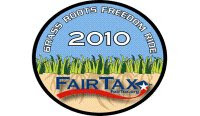This came from a FairTax Volunteer - a good read and the hard truth...............
American tax payers bear a financial burden over and above what they pay in federal taxes. This extra burden consists in covering the tax gap and both the time and money spent to comply with the tax code. For 2001 alone the 130 million Americans who filed tax returns paid on average $2,649 extra to fill the gap created by Americans who did not pay their share. This means that the tax bills paid could have been 32.1% LOWER! These 130 million compliant tax payers paid on average $8,265when they should have paid only their fair share of $5,616.
The compliance burden hangs like a huge stone around the necks of all tax payers. It consists of all the time and money wasted on filling out forms, maintaining records, studying tax rules and other tax-related chores. Since 1913 the tax code has grown from 400 pages to over 67,000. In 2005 individuals, businesses, and non-profits spent 6 billion hours and over $265.1 billion to comply with the tax code. The hours spent represent a work force larger than the combined populations of Dallas, Detroit, and Washington DC and more than the total of workers employed in the auto, computer manufacturing, airline manufacturing, and steel industries.
Compliance costs are very regressive, hitting the poorest hardest. Adjusted gross incomes of less than $20,000 pay 5.8% of income while those of over $200,000 pay only 0.45%.
Small businesses bear an unfair burden in compliance costs. As far back as 1991 corporations with under $1 million or less in assets (90% of all corporations) paid $382 in compliance costs for every $100 they paid in income taxes. Corporations with $250 million or more in assets paid about $3 in compliance costs for each $100 paid in income taxes. In 2004 the average American business taxpayer spent $894 per employee on tax compliance activities, but small employers (less than 20 employees) spent $1,304 per employee.
The compliance costs for the private sector are 30 times what the compliance expenses of the IRS are.
The FairTax plan in Congress would slash compliance costs. It would decrease the number of tax filers by 80%. The replacement of the income tax with a national retail sales tax would reduce compliance costs by 95%. This would reduce the cost of doing business and lower the prices of goods while enabling businesses to hire more workers and pay higher wages. It is a cruel hoax when politicians say they are going to raise taxes on businesses. The result of this is to decrease employment and wages and raise the prices businesses charge to the consumers of their products and services.
Subscribe to:
Post Comments (Atom)

1 comment:
Yes compliance cost are crazy. Lets make the system simple and fair.
But Fairtax isn't it. ITs not Fair, its not even rational.
Post a Comment